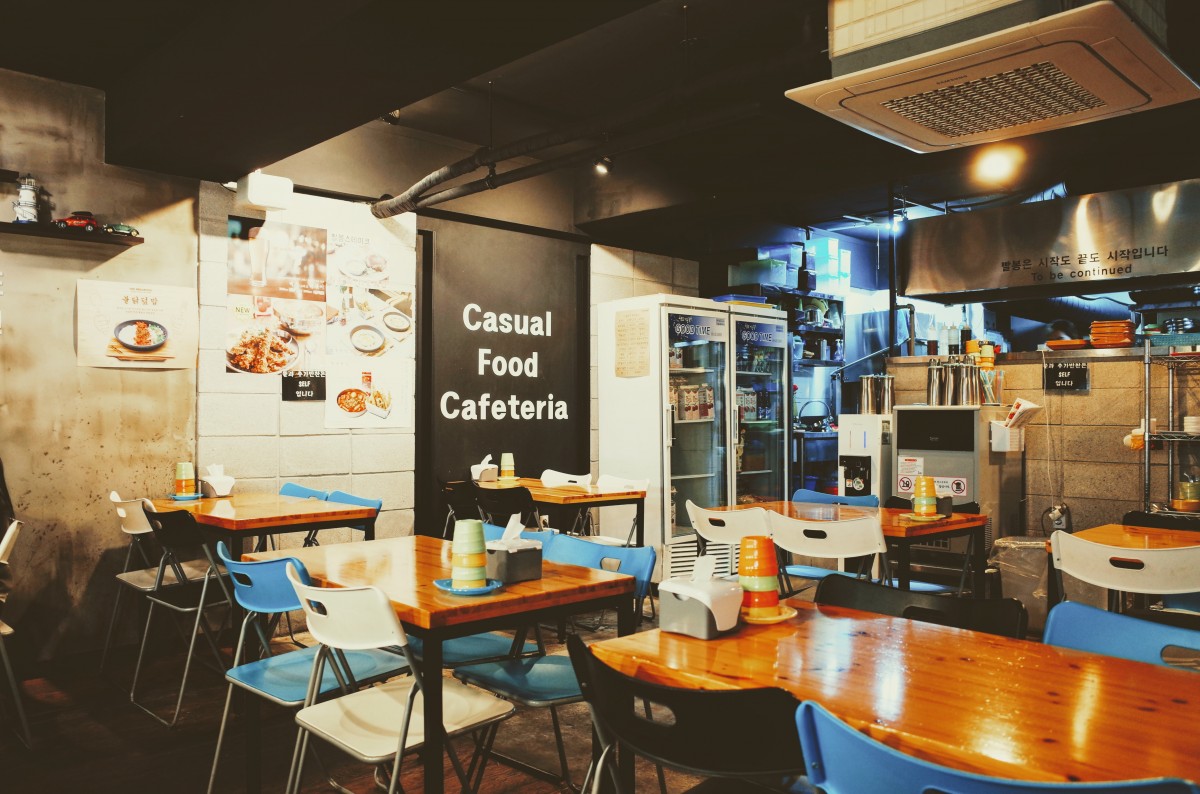A cozy place to grab a bite and get some work done. Or play minecraft.
The Food Industry: An economic beast so large, we can't fully track it's impact on the economy.
Given it's size and demand in the global market, is there a deeper reason that food is such a huge deal to people?
Food has driven decisions in society from where people settle, to what kind of foods they choose to grow. Flavor, aroma, and presentation - these things are all the driving force behind the food industry.
The most sought after foods these days requires more and more work to prepare. Even basic sandwich recipes require a monumental amount of work to make available on a day to day basis.
When Did The Food Industry Change Everything?
From the start of civilization.
Agriculture started the trend by turning us from hunter-gatherers to settlers and farmers. Why did we decide to plant and harvest in the same spots year after year?
Once we figured out what beer was, the quest for alcohol drove us to settle down and plant crops.
How did this change the way we interacted with others?
Obviously when one person decided to settle more followed in tow. It may have not looked like bringing a bag of coins in for a well cooked meal, but there was definitely bartering for food in one fashion or another happening.
As humans settled, they likely found that working together and specializing in things benefits themselves and those around them. This spirit is where modern food service comes into play.
Towns grew, and their productivity did as well. Trading with other settlements opened the road for logistics work.
Logistics is a multi-trillion dollar a year business across all products, with Food Logistics taking nearly 93 billion dollars of that market in 2017.
Yes I'm writing while hungry. Yes it looks just as amazing to me.
How Does The Global Food Service Market Impact Modern Culture?
Heavily.
When you think of what you eat on a day to day basis, do you think of your food choices as cultural choices?
A club sandwich may seem like a pretty standard meal in America, but it's quite foreign to other cultures. Just as foreign as the idea of eating grasshoppers likely is to us.
They're around in America too, so why didn't we take to eating grasshoppers as well?
Our culture grew valuing other things based on their accessibility. Sure, grasshoppers were accessible. But so was bread, beer, and butter.
For whatever reason we decided that grasshoppers weren't a worthwhile food choice. What foods did impact the way we interact with one another?
Here's a comprehensive list with details on all your favorites. Caution: Don't read while hungry!
As each new food grew in popularity, it impacted the local culture and economy in a myriad of ways:
The local economy is stimulated, attracting business from other towns and cities.
As the business grows in popularity it requires more workers and more materials.
Often times the dish itself is brought back to the traveler's home town, spreading a food experience unique to where the food was originally made popular.
Imitators emerge to re-create the entree, with some expanding creatively on the meal and creating a new, entirely unique dish to call their own.
Towns with a food origin tend to take pride in it's widespread success, increasing cultural connections with travelers and locals.
What Impact Does The Individual Restaurant Have On The Culture?
Often times the impact of even a single business is overlooked by the culture that relies on it.
We all have a our favorite place to unwind with a favorite meal after a stressful day. I used to love sitting at the bar by myself with a big beer and flatbread after a long day of work.
Even at the time I knew the interactions happening between people were insanely important to the overall cohesion of the local community.
Sure there are other places to go if one doesn't suit your fancy. But for many, it's all about finding the one they love to frequent and explore the menu.
Let's not forget the menu itself is set by someone who usually has a passion for cooking, and is also looking to create a signature dish.
I've had the fortune to work at a bar and restaurant in down town Saint Paul. As a Barback it was a marvelous experience to support people who are genuinely getting to know their patrons.
To them, it was all a part of getting to know the community and the people of the world. Did they do it for the money? Absolutely.
That doesn't mean they weren't also doing it for the experience. Or because they enjoy making people smile with food.
At this restaurant it wasn't just the bartenders and servers making connections. A common practice in modern restaurants is having chefs and managers shoot the breeze with the customers while wait staff takes care of them.
Why would they go to that level of attention for people?
Because food and restaurants drive culture. They know this all too well. Not only do they know that their business relies on returning customers, they know they could very well be shaping how their customers view people.
I think pretty much all of us have met people we don't like in life. Personally, I've met far too many people I don't like to want to meet more people I don't like.
So if I were to go to a restaurant in town and sit down, would I rather have a kind manager and a chef that takes the time to just say hi, or a seemingly indifferent staff that just sees me as another tip in the jar for the shift?
I've worked on the other end of both of those kinds of places. I don't want to work, or even patron the latter restaurant. Why?
Simple: No one wants to feel like the people around them aren't worth knowing. That's what it can feel like when you go to a restaurant and the server seems indifferent to who you are or why you're there.
Who Is Running The Restaurant Industry?
Average people. Members of the community. Friends, neighbors, mom's, dad's, brothers, and sisters. You get the idea.
With 14.7 Million employees in the food service industry alone(this does not include logistics for getting the food harvested and to the restaurant), it's a big chunk of our overall community.
Over 1 million restaurant locations are open in the US alone. With only 35,000 cities and townships in the US, that's an average of 28 restaurants per city.
Keeping these numbers in mind, how does culture effect the livelihood of those working in the food industry?
Culture has a monumental impact on how food service workers are compensated. In 2017 the median income(including tips) for wait staff was $10.01.
Assuming working 40 hours per week(which is not common), that's a yearly salary of only $19200. Let's take Minneapolis for an example, using those numbers.
The cost of living index in Minneapolis is $936 without rent. That means basic costs of living starts at $11,200 per year. A 1 bedroom apartment outside of the city center is on average $1,000 per month.
Easy math right?
That's $12,000 per year in rent alone. Meaning the total cost of living is average $23,200 per year.
What was our average yearly salary for a 40 hour a week server? $19,200. Including reported tips.
I do realize there is a lot of cash floating around that goes unreported. However, I can say from experience that does not mean working as a server is always, or even usually livable.
I'll let my previous post on tipping make that point for me.
A popular dinner special from Area 57 Coffee Cafe in Wanamingo, MN
Why Is Food Service So Important To Culture?
Most of us know that automated times are ahead of us. This includes automating those providing direct services such as waiters, baristas, cooks, and bartenders.
Considering how abysmal living conditions can be for some people in these professions, I'm all on board with automation.
But will there come a time when we truly realize the value of a human on the other side of the counter? I believe there will be. Many of us already do.
Many of those who truly appreciate food service as the cultural juggernaut it is have at one point or another worked in it. They understand fully what kindness and hard work can do for their community.
Though I would argue it will take Post-Scarcity and a lot of cultural soul-searching to truly appreciate food service for the importance it truly does play in our lives.
To many their favorite restaurant is not just a place to unwind with a few friends and some good food after work. It's where they turn to when they want to know what's going on in the community.
Especially in small rural towns, the local cafe is far more than just the only place to grab a bite to eat. It's meeting your neighbors and learning more about their lives. Finding a place to catch up with a friend you haven't seen in a while, or to get some homework done.
It's hard to say the true impact food service has on culture. It truly is based on the individual and how they view it's importance in their lives.
You would be surprised how many people can go from utterly cranky to a grin so wide they look like the Cheshire Cat the moment you bring them even something as simple as a BLT.
These interactions are what drove me to be a part of the industry for so long. There's something wonderful about knowing that hard working people in your community have a place to de-stress and save some time on lunch so they can eat, relax, and get back to work.
There's truly power in these interactions, and that's why I believe Food Service is more than a commodity. It's the Industry Of Culture.





